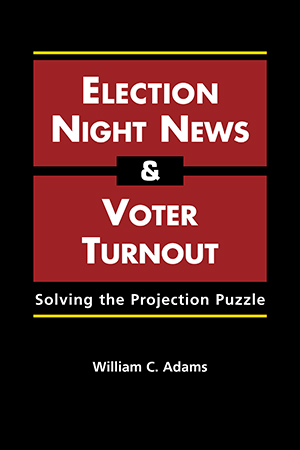William C. Adams
In eight of the past dozen presidential elections, TV networks proclaimed the winner while citizens on the West Coast, Hawaii, and Alaska were still casting ballots. Is this a problem? Do media projections decrease voter turnout? Carefully examining data from every presidential election held from 1960 through 2004, William Adams definitively answers both questions.
Adams employs a range of methods (including content analysis, focus groups, survey research, meta-analysis, and time-series analysis) to corroborate his finding that projections do not in fact discourage voter turnout but do raise serious issues of equity and perceived discrimination. His persuasive analysis suggests clear policy options designed to keep voters from feeling discounted and devalued on election day.
Click
here to view the author's personal website about this book.
William C. Adams is professor of public policy and public administration at George Washington University.
"A useful corrective to the hyperbolic histrionics that often accompany the debate about the impact of early projections. It is likely to remain the most realistic and best summary of this issue for a long time."—Kathleen A. Frankovic, Political Communication
"Does a fine job answering the question of whether projections cause declines in voter turnout.... Adams has put together a remarkable and persuasive collection of studies on an important issue, using a unique, multi-method approach that sets a great example for scholarship."—Trevor Tompson, Public Opinion Quarterly
"There is no doubt that election projection controversies will continue into the future, which will make this volume a valuable resource for some time."—Thad E. Hall, Presidential Studies Quarterly
"Adams' fine book won't end the argument over projections. But as the 2008 campaign commences, it will become the place where the argument begins."—Jack Shafer, Slate
"This clear and smartly designed analysis of the media projection/electoral choice problem is the new baseline study, and thus is essential reading for students and professionals involved in elections and election analysis. Highly recommended. All academic collections."—Choice
"Provides new insight into a unique American problem."—Chris Sterling, Communication Booknotes Quarterly
"The best treatment of the issue of election night projections yet to appear. Adams draws reasonable and balanced conclusions, and makes sensible recommendations for policy changes that could minimize an important controversy in our political system."—Scott Keeter, Pew Research Center for the People and the Press
"Adams brings to bear a wide-ranging set of data to conclusively analyze the impact of election night projections on voter turnout."—Michael Traugott, University of Michigan








